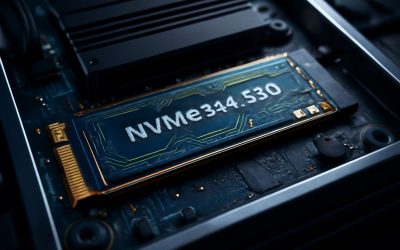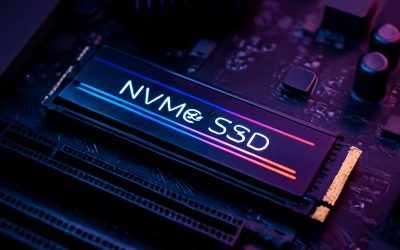
NVMe SSD storage is the newest form of solid-state memory that offers superior transfer speeds to traditional hard disk drives (HDDs). These drives store data in flash modules as bits of 1s and 0s. They can be much smaller than HDD platters and are typically used in modern laptops and pre-built desktop computers. They have the potential to revolutionize PC storage and deliver higher performance, lower latency, and better reliability than traditional hard drives.
NVM stands for Non-Volatile Memory Express and is a connection standard designed to accommodate flash storage devices. It provides much higher bandwidth than AHCI, the connection protocol for the old platter HDDs of the past. The NVMe standard also has a lower power requirement than AHCI. This means that these SSDs can be much thinner and lighter. They can fit into smaller spaces in your computer and dissipate heat more effectively than AHCI.
The earliest NVMe SSDs come in several forms. Some are the standard 2.5″ form factor you’re used to seeing if you’ve built your own PC in the past, while others are internal mounted M.2 sticks, add-in cards or various EDSFF form factors. Some have a standard SATA interface and can be plugged into your motherboard, while others require direct access to the system backplane to plug in.
Gaming is one of the key use cases for NVMe SSDs. The speed of these drives enables faster loading times for games and lower game installation times. This makes them a great choice for the best gaming PCs.
There are many other benefits of NVMe SSDs, such as their low power consumption and fast read/write speeds. They are also more durable and have a longer lifespan than SATA drives. These features make NVMe SSDs a worthwhile investment for any computer user that wants to get the most out of their machine.
The NVMe SSD market is expected to grow rapidly. This is due to the need for improved performance in business applications and high demand for fast-loading, high quality user-generated content on the internet. The increasing number of financial transactions, hypertext and other business applications will also drive the need for increased bandwidth and reduced latencies.
NVMe SSDs can be more expensive than SATA options and may require more power, but they offer advantages such as faster transfers, better reliability, and greater scalability. Some businesses will need to weigh these pros and cons and decide if the increased performance is worth the extra cost.
Compared to the SATA SSDs you’re probably used to, NVMe SSDs have up to 12x faster transfer rates and read/write speeds. However, unless your workloads are particularly data-heavy or run in settings where every microsecond counts, you may not notice the difference between an NVMe SSD and a good SATA SSD. It’s important to know your needs and the type of applications you’re running before deciding whether an NVMe-based SSD is right for your setup. If you’re not sure, a trusted IT partner can help you figure out what type of SSD is the best option for your business.



0 Comments